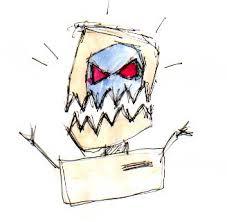
Computers in chess... Good or Evil? (Part 4)
There is no doubt that providing that you know how to use a chess engine and well aware of its shortcomings (like for example the Capablanca's position that we discussed in the previous part of this article), then you have an amazing learning tool in your hands. If the role of a computer in the modern chess was just to help people to master our beloved game, then I would be happy to announce that it is really the best thing since sliced bread! Unfortunately, now it is time to look at the dark side.
You probably already know what I am going to talk about. Yes, the notorious problem of computer cheaters is bigger these days than ever, especially since FIDE is not doing much about it (they prefer to humiliate top chess players with useless doping tests, even though there is no one single example of a chess player successfully used any kind of doping).
As the time passes, the cheaters get more sophisticated. The first chess players who used a chess engine during the game tried everything they could in order to get caught. One of the first and most famous examples happened in 1999. A 55 years old German chess player Clemens Allwermann rated just 1900 had a tournament of his life, or it looked so. In the final round he was paired against a strong Russian GM Sergey Kalinichev. Now look what happened there:
The move 31. Qa7!! is not the first that comes to mind when White has simple options like 31. Rxb7 or 31. Rxf6 gxf6 32. Qxf6 simplifying the position into a practically winning endgame. This move alone would be enough to suspect some foul play. As a matter of fact, when this move was shown to Vishy Anand, he started laughing and said that there is no doubt it was a computer's move. But I wouldn't accuse Mr. Allwermann based on just this one move. I even did a little experiment and showed the position to some of my students. One of them (rated around USCF 1800) looked at the position for 30 seconds or so and his first suggestion was 31. Qa7! Granted my student thought I was giving him a tactical exercise and therefore he was specifically looking for tactics, and yet I wouldn't accuse a chess player of cheating just based on one move. Even the next spectacular move of Clemens Allwermann wouldn't be enough for me to say for sure that he was cheating:
This tactical shot is beautiful, but pretty simple since in all the variations you need to calculate just one or two moves forward. But what happened after the game was over is amazing. Black resigned in the following position:
If Mr. Allwermann kept it quiet, then it would be not that easy to prove that he was cheating. Instead, while shaking his opponent's hand, he noticed that the resignation was very timely since it is a checkmate in eight! And this is something no human would be able to do without a computer! Also no decent chess player would even try to calculate if there is a checkmate. It would be more then enough to see that White has an insane amount of extra material that all but assures his win. So, essentially, Clemens Allwermann turned himself in! Now fast forward to the tournament that was played just 3 months ago. I find many similarities there. A Bulgarian chess player Borislav Ivanov rated just 2277 beats one GM after another and shows a performance 2697!
Now let's look at one of his games against a very respected Grandmaster Bojan Kurajica:
To me this move is pretty similar to 31. Qa7!! from the previous game. Black is about to launch an attack on the King's Side and White calmly moves his Rook away from his King. Does the guy have nerves of steel? Let's see the next remarkable moment:



